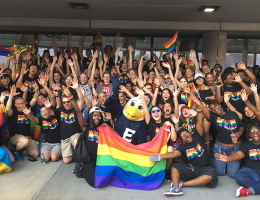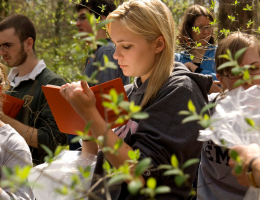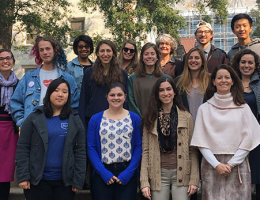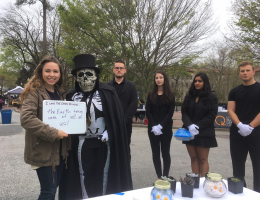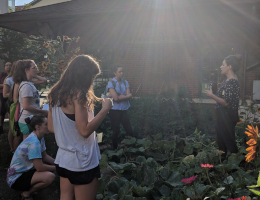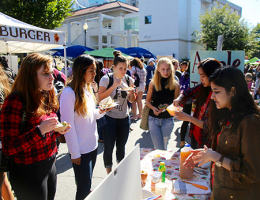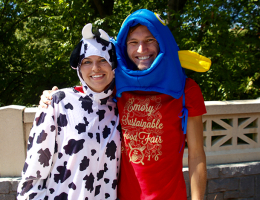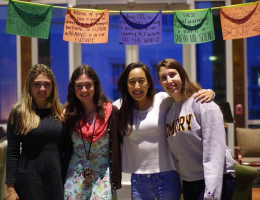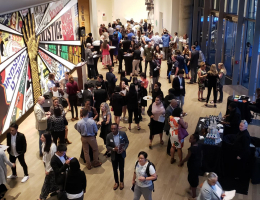Emory University strives to integrate sustainability into every aspect of student life. Find resources, events, and opportunities to learn, lead, and live a sustainable life at Emory.
Acknowledging the ancestral peoples and land
Emory’s Office of Sustainability Initiatives acknowledges the Muscogee (Creek) people who lived, worked, produced knowledge on, and nurtured the land where Emory’s Oxford and Atlanta campuses are now located. The Muscogee people were forcibly removed from states like Georgia and Alabama during the Trail of Tears relocation (1830-1838), a shameful part of our history when the federal government forced Indigenous peoples across the region to leave their ancestral homes. In 1836, Emory University was founded on part of this land. It is important for us to acknowledge, honor, and respect the land we now call home; to further recognize the inherent intersections between Indigenous rights, sustainability, and the environment; and to continue to strive for justice and recognition for Indigenous communities.
Read Emory’s official Land Acknowledgement and learn more here.
GET INVOLVED
- Prepare for your first year with our Sustainability Orientation guides for Undergraduates, Graduate & Professional Students, and Oxford College.
- Explore our Student Sustainability Showcase Virtual Guide to learn how to get involved in an OSI program, sustainability-related student organization, or Emory’s academic offerings in the disciplines of the environment and sustainability!
- Take the Sustainability Pledge. It’s quick, easy — and demonstrates your commitment to living green!
- Be a sustainability leader through internships, clubs, and volunteer opportunities. Learn more about former OSI interns who were chosen two years in a row as Emory’s Student Employee of the Year in 2018 and 2019.
- Need funding for a sustainable idea on campus? Apply for one of OSI’s Incentives Funds.
- Check out our Events Calendar for upcoming events on campus.
KEEP IT SUSTAINABLE
- Find out how to recycle and compost on campus, and how you can help us achieve zero landfill waste as a Zero Waste Ambassador.
- Enjoy locally and sustainably sourced food in campus cafes and coffee shops and learn to grow your own food in the Educational Gardens on campus.
- Opt for greener transportation to, from, and around campus.
LEARN MORE
- Undergraduate and graduate students have many opportunities to take sustainability courses; pursue sustainability minors, concentrations, certificates and degrees; and contribute to sustainability-related research at Emory.
- Get more details by reading the Emory Sustainability Vision and Strategic Plan.
- Emory is implementing multi-faceted, evidence-based climate solutions on campus. Learn more about the institution’s work and ways to contribute individually. Find some current student perspectives here.
- Sign up for the Office of Sustainability e-newsletter; follow us on Facebook, Instagram, and Twitter.
Helpful Documents and Links for Current and Prospective Students
| Title | Initiative | Type | Description |
|---|---|---|---|
| 2023 Climate Solutions Fellow Job Description | Climate Solutions | ||
| Emory’s 2023 Climate Action Plan | Climate Solutions | Documents & Reports | Emory's most recent climate action plan offers recommendations to guide Emory on its path to net neutrality by 2050. |
| FY2021 Greenhouse Gas Emissions Inventory Full Report | Buildings, Climate Solutions, Energy, Transportation, Waste, Water | Documents & Reports | Emory regularly evaluates its greenhouse gas (GHG) emissions, or carbon footprint, in order to monitor its efforts to reduce emissions to net-zero by 2050 through strategies that entail targeted mitigation, behavior change, clean and renewable energy sources, and new innovations. GHG emissions reporting began in FY10, with 2005 as the original baseline year, and subsequent inventories have been conducted in 2013, 2014, 2016, 2019, and 2021. |
| Graduate and Professional Student Sustainability Guide 2023 | |||
| Graduate Student Sustainability Guide 2024 | All Initiatives | Documents & Reports | Sustainability Guide for Emory graduates. |
| Oxford Student Sustainability Guide 2023 | |||
| Recycling and Composting at Emory University | Waste | Guides | Landfills have negative social, economic, and environmental impacts on neighboring lower-income, historically disadvantaged communities. Landfills contribute to greenhouse gas emissions and can leak harmful toxins into the surrounding environment. Learn about recycling and composting at Emory with this helpful brochure! |
| Spring 2024 OSI Farmers Market Internship Job Description and Application Instructions | Academics | Documents & Reports | A job description for students interested in applying as a "Famers Market" intern for spring 2024. Includes application instructions. |
| Spring 2024 OSI General Internship Job Description and Application Instructions | Academics | Documents & Reports | A job description for students interested in applying for a "General" OSI internship for spring 2024. Includes application instructions. |
| Student Sustainability Showcase Virtual Guide 2024 | All Initiatives | Guides | Use this virtual guide to explore opportunities to get involved with sustainability at Emory, then pursue those which most interest you. Take part in our campus culture of sustainability by participating in an OSI program, joining a sustainability-related student organization, and/or exploring Emory's academic offerings in the disciplines of the environment and sustainability! |
| Summer 2023 Communications and Marketing Intern Description | |||
| Summer 2023 General Sustainability Intern Description | |||
| Undergraduate Student Sustainability Guide 2023 | |||
| Zero Waste Ambassadors Charge Fall 2022- Spring 2023 | Waste | Documents & Reports | The ZWAs are a group of student, faculty, and staff volunteers, who are actively willing to champion waste management and reduction in all areas of the Emory experience. They strive to promote a culture at Emory that prioritizes reducing and diverting waste in all decisions that we make as individuals and as a community. You can read more about specific goals of the program this year in the charge. |

